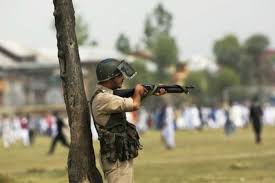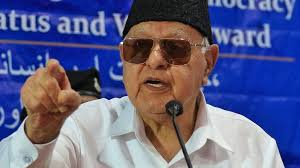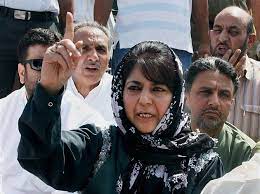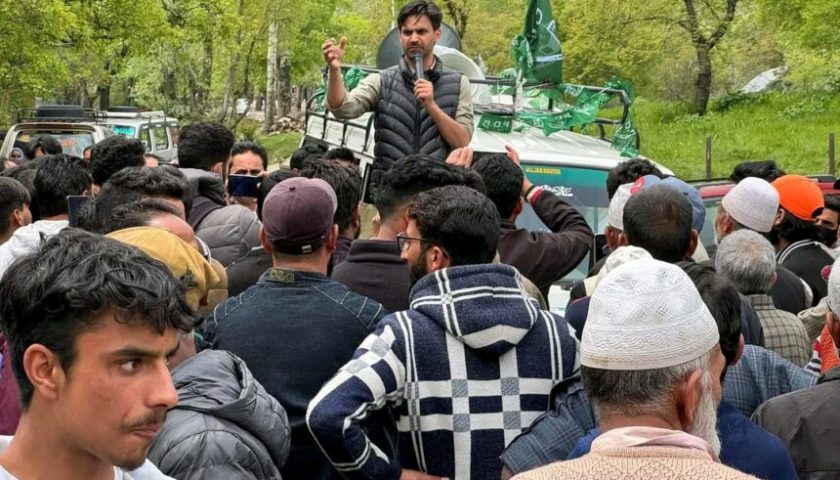 The National Human Rights Commission has told the UN Human Rights Council (UNHRC) that use of pellet guns during the turmoil in Kashmir Valley was “controversial”, but human rights of security personnel are also involved as crowd pelts stones at them. It alleged that the turmoil in Kashmir was “augmented by trans-border terrorism and ‘jihadi’ funding from the neighbouring country”, in a veiled reference to Pakistan.
The National Human Rights Commission has told the UN Human Rights Council (UNHRC) that use of pellet guns during the turmoil in Kashmir Valley was “controversial”, but human rights of security personnel are also involved as crowd pelts stones at them. It alleged that the turmoil in Kashmir was “augmented by trans-border terrorism and ‘jihadi’ funding from the neighbouring country”, in a veiled reference to Pakistan.
“The turmoil in Kashmir is on the spotlight now… The use of plastic pellets by CAPFs (Central Armed Police Forces) is controversial. The NHRC has taken up a case on the matter but withholds its comments now because human rights of both sides are involved, when young crowd pelt stones at police personnel,” the rights panel says.
India’s human rights record will be examined by the UN Human Rights Council’s Universal Periodic Review (UPR) Working Group on Thursday in a meeting in Geneva that will be webcast live.
The NHRC report has been submitted to the UPR Working Group.
The use of pellet guns by security personnel to control the crowd has been at the centre of a raging debate.
The Commission also said there was a 17 per cent rise in communal violence in 2015 as against 644 in 2014. The Communal Violence (Access to Justice and Reparations) Bill 2013, was yet to become law, it added.
In its report to the UN body, the NHRC also referred to violence due to beef eating.
“Sporadic instances of violence concerning eating of beef have been reported. The fringe wing of Hindutva brigade is alleged to be behind these incidents which are few and far between. Though disquieting, it is too early to assess whether they could be a threat to secular and pluralistic structure of Indian society,” NHRC said.
The rights body also slammed the government for not ratifying the UN Convention Against Torture (CAT).
The Commission says, “The legal system continues to be dysfunctional with slow disposal of cases and inordinate delay in giving finality to both criminal and civil litigation.”
On Centre’s ‘Swachh Bharat Abhiyan’, the NHRC said even though the government has taken initiatives , “a large number of habitations/households do not have access to safe drinking water sources.”
Meanwhile, the third Indian UPR will be reviewed in the course of the 27th Session of the UPR Working Group being held from May 1 to 12, the ministry said in a statement.
The UPR is a unique process which involves a review of the human rights records of all UN member-states. IT is a state-driven process, under the auspices of the UNHRC, which provides the opportunity for each state to declare what actions have been taken to improve the human rights situations in their countries and to fulfill their human rights obligations.
The UPR was created through the UN General Assembly on March 15, 2006, by resolution 60/251, which established the UNHRC itself.
India’s first UPR was reviewed in 2008 and the second in 2012.
According to the External Affairs Ministry statement, Attorney General Mukul Rohatgi is leading the Indian delegation which also comprises Ruchi Ghanashyam, Secretary (West) in the External Affairs Ministry, P.S. Patwalia, Additional Solicitor General of India, and senior officials from the External Affairs, Home, Women and Child Development, Social Justice and Empowerment, Minority Affairs, Rural Development Ministries and the NITI Aayog.
“The national report of India covers areas that were part of the recommendations accepted by us following the UPR-II in 2012,” the statement said.
Use of Pellet guns controversial: National Human Rights Commission






